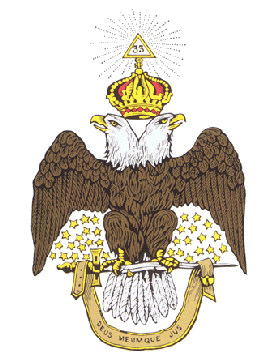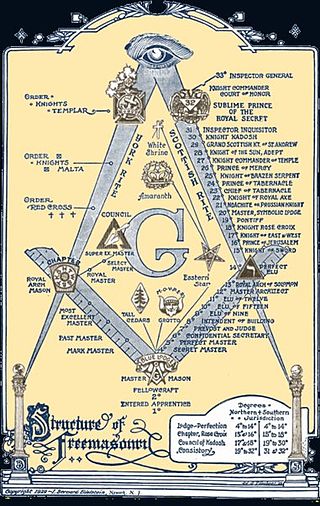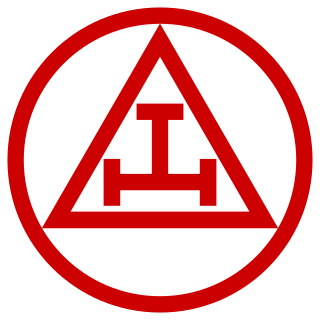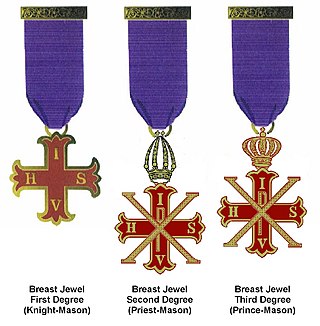
The Ancient and Accepted Scottish Rite of Freemasonry is a Rite within the broader context of Freemasonry. It is the most widely practiced Rite in the world. In some parts of the world, and in the Droit Humain, it is a concordant body and oversees all degrees from the 1st to 33rd degrees, while in other areas, a Supreme Council oversees the 4th to 33rd degrees.
The York Rite, sometimes referred to as the American Rite, is one of several Rites of Freemasonry. It is named for, but not practiced in, York, Yorkshire, England. A Rite is a series of progressive degrees that are conferred by various Masonic organizations or bodies, each of which operates under the control of its own central authority. The York Rite specifically is a collection of separate Masonic Bodies and associated Degrees that would otherwise operate independently. The three primary bodies in the York Rite are the Chapter of Royal Arch Masons, Council of Royal & Select Masters or Council of Cryptic Masons, and the Commandery of Knights Templar, each of which are governed independently but are all considered to be a part of the York Rite. There are also other organizations that are considered to be directly associated with the York Rite, or require York Rite membership to join such as the York Rite Sovereign College but in general the York Rite is considered to be made up of the aforementioned three. The Rite's name is derived from the city of York, where, according to one Masonic legend, the first meetings of Masons in England took place.

Freemasonry in Malta has a lengthy history dating from the eighteenth century. The main masonic influences have been from the United Grand Lodge of England, the Grand Lodge of Scotland, and the Grand Lodge of Ireland. Today Regular Freemasonry is under the jurisdiction of the Sovereign Grand Lodge of Malta, formed in 2004.

The International Order of Freemasonry Le Droit Humain is a global Masonic Order, membership of which is available to men and women on equal terms, regardless of nationality, religion or ethnicity.

The Order of Mark Master Masons is an appendant order of Freemasonry that exists in some Masonic jurisdictions, and confers the degrees of Mark Mason and Mark Master.

The Royal Order of Scotland is an appendant order within the structures of Freemasonry. Membership is an honour extended to Freemasons by invitation. The Grand Lodge of the Royal Order of Scotland is headquartered in Edinburgh, with a total of 88 subordinate Provincial Grand Lodges; of these, the greatest concentration is in the British Isles, with the rest located in countries around the world.

The Knights Templar, full name The United Religious, Military and Masonic Orders of the Temple and of St John of Jerusalem, Palestine, Rhodes and Malta, is a fraternal order affiliated with Freemasonry. Unlike the initial degrees conferred in a regular Masonic Lodge, which only require a belief in a Supreme Being regardless of religious affiliation, the Knights Templar is one of several additional Masonic Orders in which membership is open only to Freemasons who profess a belief in Christianity. One of the obligations entrants to the order are required to declare is to protect and defend the Christian faith. The word "United" in its full title indicates that more than one historical tradition and more than one actual order are jointly controlled within this system. The individual orders 'united' within this system are principally the Knights of the Temple, the Knights of Malta, the Knights of St Paul, and only within the York Rite, the Knights of the Red Cross.

There are many organisations and orders which form part of the widespread fraternity of Freemasonry, each having its own structure and terminology. Collectively these may be referred to as Masonic bodies, Masonic orders, Concordant bodies or appendant bodies of Freemasonry.
Born in New Hampton, New Hampshire, on February 19, 1792, Simon Wiggin Robinson was the son of Captain Noah Robinson, who served honorably in the American Revolution. Young Robinson served his country, also, in the War of 1812 when he was stationed at Portsmouth, New Hampshire, as an Adjutant.

The Royal Arch is a degree of Freemasonry. The Royal Arch is present in all main masonic systems, though in some it is worked as part of Craft ('mainstream') Freemasonry, and in others in an appendant ('additional') order. Royal Arch Masons meet as a Chapter; in the Supreme Order of the Royal Arch as practised in the British Isles, much of Europe and the Commonwealth, Chapters confer the single degree of Royal Arch Mason.

Royal Arch Masonry is the first part of the American York Rite system of Masonic degrees. Royal Arch Masons meet as a Chapter, and the Royal Arch Chapter confers four degrees: Mark Master Mason, Past Master, Most Excellent Master, and Royal Arch Mason.
The history of Freemasonry in Mexico can be traced to at least 1806 when the first Masonic lodge was formally established in the nation.

The Red Cross of Constantine, or more formally the Masonic and Military Order of the Red Cross of Constantine and the Appendant Orders of the Holy Sepulchre and of St John the Evangelist, is a Christian fraternal order of Freemasonry. Candidates for the order must already be members of Craft Freemasonry (lodge) and Royal Arch Freemasonry (chapter); they must also be members of the Christian religion, and proclaim their belief in the Christian doctrine of the Holy Trinity.

The Order of Knight Masons is a chivalric Masonic order, open to all Master Masons who are also members of a Mark Lodge and a Royal Arch Chapter Members of the order meet in Councils of Knight Masons which are governed by the Grand Council of Knight Masons based in Dublin, Ireland. A member of the group is a Knight Mason.
Freemasonry in Scotland in lodges chartered by the Grand Lodge of Scotland comprises the Scottish Masonic Constitution as regular Masonic jurisdiction for the majority of freemasons in Scotland. There are also lodges operating under the Scottish Masonic Constitution in countries outside of Scotland. Many of these are countries linked to Scotland and the United Kingdom through the Commonwealth of Nations and prior colonies and other settlements of the British Empire although there are several lodges in countries such as Lebanon, Belgium, Chile and Peru, which do not have such connections.
The Rite of Baldwyn or Rite of Seven Degrees is one of several Rites of Freemasonry. It exists and is only practised in the Masonic Province of Bristol, England in Freemason's Hall. A Rite is a series of progressive degrees that are conferred by various Masonic organizations or bodies, each of which operates under the control of its own central authority. The Rite of Baldwyn specifically is a collection of separate Masonic Bodies and associated Degrees that would otherwise operate independently. The three primary bodies in the York Rite are the degrees of Craft Freemasonry, the Supreme Order of the Holy Royal Arch, and the Camp of Baldwyn.

Mark Masons' Hall in Westminster, Greater London, is the headquarters of The Grand Lodge of Mark Master Masons of England and Wales, which is also responsible for the Royal Ark Mariner degree. It is located in 86 St James's Street in the district of St James's, opposite St James's Palace. While Freemasons' Hall is the headquarters of the United Grand Lodge of England and the Supreme Grand Chapter of Royal Arch Masons of England, Mark Masons' Hall is the home of several other important appendant orders of Freemasonry in England and Wales.
The Supreme Council, Scottish Rite, Northern Jurisdiction oversees the Scottish Rite of Freemasonry in fifteen states: Connecticut, Delaware, Illinois, Indiana, Maine, Massachusetts, Michigan, New Jersey, New Hampshire, New York, Ohio, Pennsylvania, Rhode Island, Wisconsin and Vermont. This territory has existed since 1827 when the NMJ gained jurisdiction "over the then 14 states situated east of the Mississippi and north of the Mason-Dixon Line. Wisconsin was not yet a state, but part of Michigan."

In Freemasonry, the first three Masonic degrees constitute the fundamental degrees in all Rites they are called Blue Lodge of Craft degree.















